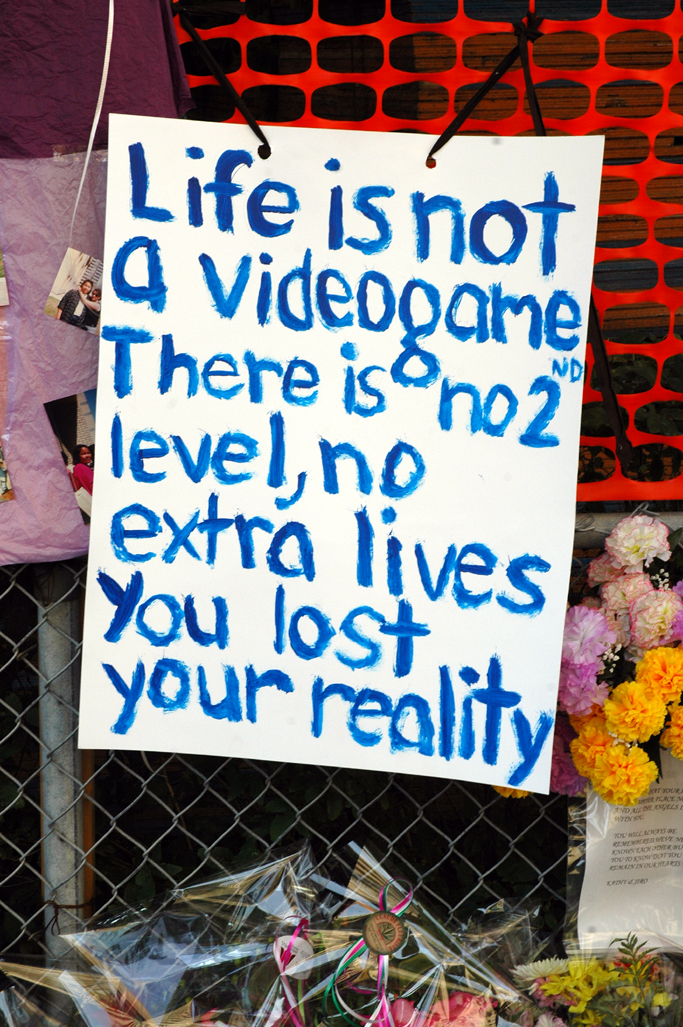A few months ago, my son got in the car after school, and said: “Mom, if I’m quiet on the ride home its just ‘cause I am thinking about how I’d stop the intruder.”
“What intruder?” I asked, assuming he was talking about a book he was reading.
“Well, we went on lock-down today, because there was a guy with a gun at some other school. My friends were scared, but I wasn’t.”
This was the first I had heard about the incident. My son, though, had learned about the man with the gun because it was announced over the school intercom. The students were told they might not get to go home on time, and they’d learned that the man had run away and seemed to be heading north. When the incident was over, school officials dismissed the children in a different way – the kids didn’t stand outside as usual, but were cabined behind protective glass in a hallway behind double locking doors.
All of this made tremendous sense to my son, as safety measures.
“I wasn’t scared at all, mom,” he said.
Let’s leave aside for the moment the fact that my kid heard an intercom announcement about a gunman at another school and that I heard about it from him – after the fact. Let’s leave aside, too, that my husband first heard about it when the electrician at his job asked, “What school does your son go to?”
And let’s also ignore the fact that the other kids in my son’s class also heard the warning about a school their older brothers and sisters attend, one where some of their parents work.
The second I understood what my son was saying — that a man with a gun threatened to hurt kids at a school in my city, and that my son knew about it — my hands shook on the steering wheel and my eyes filled with tears. I had to pull over to breathe. And, even as I knew that this emotional response was completely unnecessary – He was fine! All was well! – it was absolutely beyond my control to feel any differently. My mind went to Sandy Hook, to Columbine, to Marysville, to the catalog of horribles that occur when angry and unbalanced young people bring guns to school.
I pulled myself together and tried to talk about other things as we drove home, but my son kept returning to the topic.
“I heard that once, when a gunman came to a school,” he said, “a girl pretended to be dead and he left her alone.” He continued, “I would want to save my friends, but I don’t know if I would be powerful enough to stop someone with a gun.”
He repeated, again and again, that he wasn’t afraid. “My friends were afraid, but I wasn’t,” he said then added, “I don’t know why I keep talking about this.”
I suggested that perhaps he was scared, and that talking about it helped. He thought about that, then clarified, “I really wasn’t scared. I knew we were safe. But I felt tense about it. I think I will feel tense all night.”
Indeed.
We live in a peaceful, mid-size city, in a rural state, in the middle of the country. Earlier this week, one of our suburban high schools was closed after threats on social media led authorities to be concerned about the potential for a school shooting. There were three shootings that morning, in a neighborhood that can’t remember when there were such things – two people were injured while clearing ice and snow from their car, in a seemingly random set of attacks.
Earlier this semester, a first year student at my university was arrested after making threats on Yik Yak – he said he’d turn our school into another Columbine. Faculty were informed of the threat over email. It was a vague enough email that most of us weren’t even scared.
As we learned more, though, we were sure as hell tense about the situation.
Like my son, I’m tense about these things, almost all the time. I’m tense in movie theatres when I see people texting, and during massive displays of violence masquerading as entertainment. I’m tense when I meet with students who clearly need mental health services, and are angry about grades, workload, or perceived slights. I’m tense, sometimes, when I teach; it is vulnerable to be at the front of the room.
But, I’m also not like my son, I guess. I’m old enough and mature enough that I will admit to being scared, too.
And, I wonder what this tension and fear does to me, and to my kid. I wonder what learning about active shooter events does to the real learning of our children – what the tension they feel as they practice active shooter drills does to their learning the rest of their days. Preliminary studies seem to show that the impact is harmful to both their education and sense of security; I know I never feel “safer” when I learn they’ve had a safety drill. And I wonder how their teachers feel, evaluating behavioral issues in pre-teen kids, thinking about the potential for violence.
There ought to be a law against having to feel so tense and afraid about the possibility that a random, angry youth with access to a weapon will make my son’s training for “active shooter events” useful. There ought to be a law against nine-year-olds knowing that the bathrooms in their classroom are concrete blocks of safety to which they can retreat.









